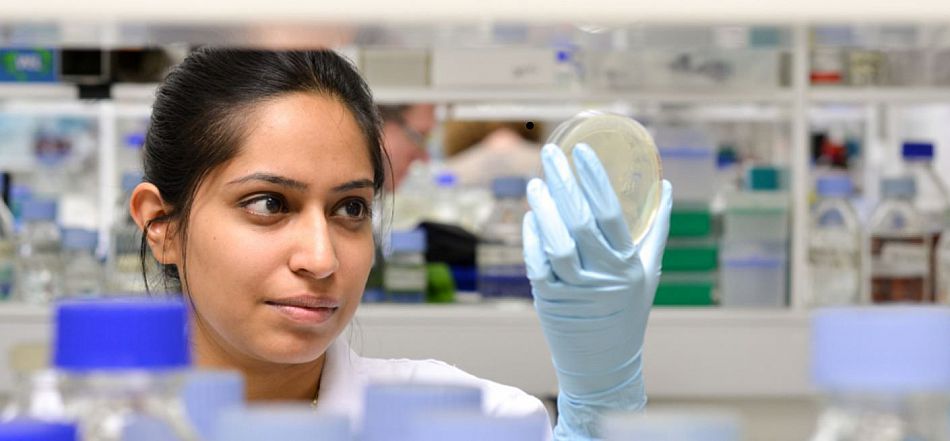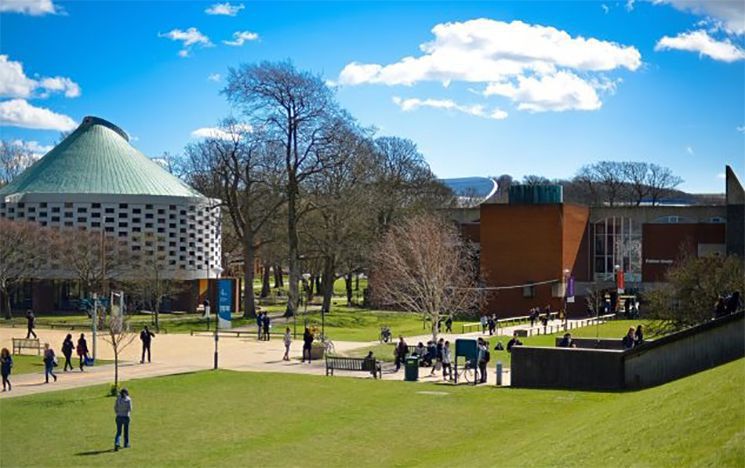Business collaboration
Enhance your business's research and development by collaborating with the University of Sussex and our state-of-the-art facilities. Contact us today about accessing our comprehensive suite of services, including NMR, X-ray, Mass Spectrometer, Electron Microscopy (including cryo-EM), and Microscope suites.

Explore our state-of-the-art facilities available to researchers across the University.
NMR facility
Nuclear Magnetic Resonance (NMR) spectroscopy is crucial for determining the structure of small molecules, small to medium-sized proteins and nucleic acids.
The NMR facility focuses on small molecule research but also supports protein NMR spectroscopy. It aids in structure determination of compounds synthesised by research groups in chemistry and drug discovery.
A wide variety of experiments are available allowing us to determine connectivities, i.e. how the atoms are put together in a given molecule. We can also probe the dynamics of a system and ask questions such as are regions of a molecule more or less flexible, what is the aggregation state of a system etc.
For biological samples, preliminary experiments on protein stability and sample quality can be conducted, facilitating access to specialist facilities like national spectrometers.
Our School houses three Varian VNMRS solution-state NMR spectrometers, offering extensive NMR capabilities for researchers. Each spectrometer is equipped with pulsed field gradients and supports variable temperature operations. These instruments are accessible to all researchers on an open-access basis.
- 400 MHz Spectrometer: Primarily supports inorganic chemistry with an X {1H-19F} broadband probe
- 500 MHz Spectrometer: Features a 2-channel system with an inverse 1H{13C} probe
- 600 MHz Spectrometer: A 3-channel system with both an X {1H-19F} broadband probe and a1H {13C/15N/31P/2H}
AutoPenta Probe, ideal for small molecule work and structural studies of small to medium-sized biopolymers. It includes an autosampler robot
Using the NMR facility
The NMR facility is available to external researchers. Usage can be costed by the sample or at an hourly rate. Analysis can be conducted on-site after suitable training or as part of a service contract.
Make a booking
For more details, contact facilitiesenquiries@sussex.ac.uk
Mass Spectrometry Research Facility
Mass Spec Facility
The facility houses eight advanced mass spectrometers with configurations like triple quadrupole, ion trap, and Q-ToF, using ionisation techniques such as EI, ESI, APCI, APPI, and ICP. GC and LC systems are also interfaced with some MS units.
Using the Mass Spectrometry Research facility
The mass spectrometry research facility is available to external researchers. Usage can be costed by the sample or at an hourly rate.
Mass Spectrometry Research Facility location
Located on the ground floor of Chichester II, the Mass Spectrometry Research Facility supports the analysis of small and large molecules. Established in 1993, the centre is renowned for discovering fullerenes and holds several patents. It serves internal and external users, including other universities and private companies.
Make a booking
For more details, contact facilitiesenquiries@sussex.ac.uk
X-ray crystallography
Crystallisation Laboratory
Our laboratory features the complete Formulatrix crystallisation suite, including the Formulator, NT8, and two RockImagers (4C and 20C). The Formulator creates 96-well optimisation plates, the NT8 sets up drops (10-15 nl per drop), and the RockImagers have capacities of 500 plates each, offering visible and UV imaging. RockMaker software integrates the suite for efficient plate design and tracking. Additionally, we use a Douglas Instruments Oryx8 (15-20 nl per drop) for fine pH screening and matrix micro-seeding. Most commercial crystallisation screens are available.

X-Ray Facility
The X-Ray Facility contains two X-Ray generators for data collection:
- Bruker Gallium MetalJet System: The highest intensity in-house system available for protein and chemical crystallography, equipped with a SCOUT robot and automated goniometer head for automated crystal loading, centering, and data collection. It includes an ISX stage for in-plate data collection of protein crystals.
- Rigaku Gemini Ultra Diffractometer: Suitable for chemical crystallography at Mo and Cu wavelengths, ideal for larger, well-diffracting crystals
Using the X-Ray Facility
The X-ray facility is available to external researchers.
Make a booking
For more details, contact facilitiesenquiries@sussex.ac.uk
Electron Microscopy Facility
The Electron Microscopy Imaging Centre (EMIC) of the School of Life Sciences was renewed in 2021 with state of the art Cryo-EM facility equipped with a CryoARM200 .We are aiming to support and develop structural biology research projects across the University of Sussex. These range from atomic scale particle analysis to the tissue and cellular ultrastructure imaging by using a range of transmission electron and Cryo-electron microscopes, and integrative imaging approaches. We are a CryoEM imaging centre with access to eBIC using a BAG allocation for high-resolution 300 kV data acquisition.

Our JEOL CryoARM (200kV, Cold FEG) is equipped with a Gatan K2 DDE camera, Omega energy in-column filter and phase plate.
This latest generation of state of the art CryoEM microscope is ideal for atomic scale resolution SPA analysis of isolated particles and CryoET tomography. It allows automatic Cryo-sample loading and storage of up to 12 samples in the microscope.
JEM1400+ TEM microscope

Our JEOL JEM1400-Plus (120kV, LaB6) is equipped with a Gatan OneView 4K camera optimised for both sensitivity and speed at 25 fps. This latest generation of high frame rate CMOS sensor allows automatic real time drift correction for negative staining screening, high resolution 2D and embedded cellular sections tomography. The microscope is also fitted with high contrast imaging objective apertures for biological samples and set up for low dose image acquisition for CryoEM screening (Serial EM and Recorder suites).
Make a booking
For more details, contact facilitiesenquiries@sussex.ac.uk
Wolfson Centre for Biological Imaging
The Wolfson Centre for Biological Imaging is a centralised, multi-user facility providing expertise in biological imaging and image analysis. It houses over 20 optical microscopes, including super-resolution, confocal, wide-field, live-cell, and multi-photon microscopy. The microscopes are available for use by registered users 24 hours a day, year-round.
The Centre supports a wide range of biological and biomedical research, from high-speed imaging of neural impulses to ultrastructural resolution of genes and proteins. We welcome projects from basic science as well as applications related to human disease investigation and drug discovery. For more details, please visit the Centre's website.
Make a booking
For more details, contact Dr Yan Gu yg90@sussex.ac.uk
Laboratories and Office Space Rental
We also offer leasing options for laboratories and office space. If you would like to arrange a visit to discuss a bespoke rental agreement for your company, please contact us at facilitiesenquiries@sussex.ac.uk
If you can’t find what you’re looking for, or if you’re interested in collaborating with our world-leading academics, please reach out to our Innovation and Business Partnerships team at collaborate@sussex.ac.uk
Where is the University of Sussex?
With the South Downs on our doorstep, we're well-served by train, bus and road while cycling is also popular. We are nine minutes from Brighton, an hour from London and 30 minutes away from an international airport.
